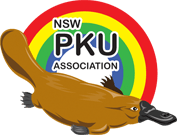Update: September 2013
Our small but dedicated research team continues with our PKU-focused research.
PKU Gene Research:In the last research update I reported on Gladys Ho’s efforts evaluating a new class of drugs that could be potentially useful for the 10% of individuals with PKU who have one of the so-called nonsense mutations. This paper has now been published, and the abstract relating to it can be found at PubMed (nothing to do with a drinking establishment for medical researchers!):
In vitro read-through of phenylalanine hydroxylase (PAH) nonsense mutations using aminoglycosides: a potential therapy for phenylketonuria. Ho G, Reichardt J, Christodoulou J. J Inherit Metab Dis. 2013 Mar 27. [Epub ahead of print] PMID: 23532445
In addition, Gladys is in the final stages of preparing a manuscript summarising our efforts in characterising the PKU gene (PAH) gene in over 100 individuals with PKU seen at the clinic at the Children’s Hospital. We hope to submit this to one of the medical research journals in the near future for review.
GM Probiotic Research:We continue to gather evidence for the potential value of our PKU probiotic as a new therapeutic. Naz Al-Hafid was given an opportunity to present our work at the recent International Congress of Inborn Errors of Metabolism in Barcelona in early September, which was attended by over 2500 people from around the world. She gave an excellent presentation, which attracted considerable interest, including from another international company. I had an opportunity to have discussions with the CEO of this company at the conference, and we will hopefully be exploring strategies to progress the PKU probiotic through international regulatory bodies, and ultimately into clinical trials. This is a slow and arduous process, and is likely to take us a year or more.
In addition, the Hospital has decided to engage the help of a professional organisation to help in future engagement and discussions with potential commercial partners.
In the meantime, we continue to work on improving the product. Taking the advice of colleagues, it may prove better to move our system into another probiotic, which would have improved survival in the gut. We are currently considering this option, while at the same time Dr Tong in our lab is trying to get some molecular tweaks happening to improve stability of the probiotic and the PAL enzyme.
Finally, when Naz returns from a well-earned break, she will make the final preparations to test whether our GM probiotic can break down and clear phenylalanine contained within protein.
As always, we are extremely grateful to all our supporters, financial and moral, without who we would not be able to maintain the momentum of our PKU research.
